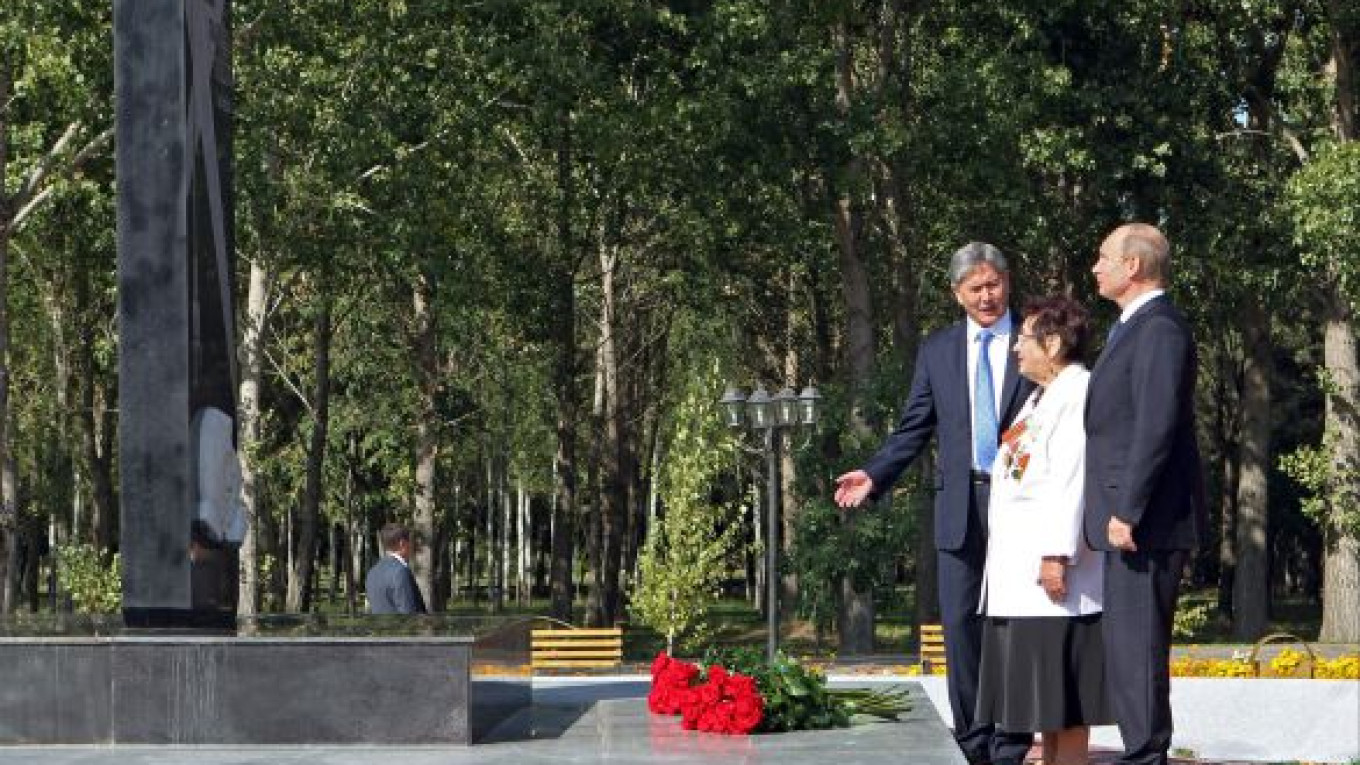BISHKEK — Russia agreed on Thursday to write off nearly $500 million in debt due from Kyrgyzstan in exchange for a package of deals that will extend Moscow's military and energy footprints on the volatile fringes of the former Soviet Union.
As Kyrgyzstan confirmed plans to close a U.S. base used to fly troops in and out of Afghanistan after Washington's lease expires in 2014, President Vladimir Putin secured a 15-year extension to Russia's lease on its own base in the country.
The deals, which will see Russian companies build hydropower plants allowing them to mediate between conflicting interests over water use, reinforce the Kremlin's influence in Central Asia as the region guards against the possible spillover of Islamist militancy from Afghanistan.
"A Russian military presence both in Tajikistan and Kyrgyzstan is a significant factor in stability," Putin said, invoking old Soviet ties in a joint news conference with Kyrgyz President Almazbek Atambayev.
Mainly Muslim Kyrgyzstan has suffered periodic bouts of violence and deposed two presidents since 2005. Its economy, which has contracted this year, relies on output from a single gold mine and money sent home by migrant workers in Russia.
Trade between the two countries rose 5 percent last year to $1.45 billion, official Russian data show, with Russian goods accounting for about a third of Kyrgyzstan's imports.
About 600 Russian servicemen are deployed at the air base in Kant, 20 kilometers from the capital, Bishkek, alongside four Su-25 ground-attack aircraft and four Mi-8 transport helicopters.
The extension on Russia's lease will take effect from 2017 and includes an option for a further five years.
The United States, meanwhile, is due to vacate its Manas base on the territory of Bishkek's international airport when its lease expires in 2014, the same year NATO troops are due to leave Afghanistan. Putin said he did not discuss the U.S. base.
Standing beside Putin and often sharing jokes, Atambayev said the U.S. base would be transformed into a cargo and passenger hub.
"We are entwined with Russia by a common history and destiny. We cannot have a future without Russia," said the Moscow-educated Kyrgyz leader, in power since last October.
In a two-part deal to pardon debt accumulated by Kyrgyzstan under Kurmanbek Bakiyev, the president deposed in an April 2010 revolt, Russia will write off $189 million with immediate effect and a further $300 million over a 10-year period from 2016.
Russia will also participate in the resurrection of two massive Soviet-era hydropower projects, with state electricity holding Inter RAO helping to build the Kambarata-1 plant and hydroelectric firm RusHydro signing up to the separate Verkhnye-Naryn cascade.
Mountainous Kyrgyzstan and Tajikistan view prospective hydroelectric dams as crucial to generating power for two of the former Soviet Union's most impoverished states, which currently rely almost entirely on imported electricity.
Such projects, however, have angered downstream neighbor Uzbekistan, which relies on the same rivers to irrigate farmland and supply drinking water for the region's most populous nation.
Asked about these concerns, Putin said both Uzbekistan and Kazakhstan, which also lies downstream, would be invited to participate and to play a role in management of the projects.
Russian Energy Minister Alexander Novak estimated the cost of Kambarata-1 at between $2 billion and $4 billion and Verkhnye-Naryn at $4 billion. He said both projects would be financed with debt.
Inter RAO chief executive Boris Kovalchuk told Reuters the deal for a 50-50 partnership with the Kyrgyz state had provisions to include partners from other countries.
Related articles:
A Message from The Moscow Times:
Dear readers,
We are facing unprecedented challenges. Russia's Prosecutor General's Office has designated The Moscow Times as an "undesirable" organization, criminalizing our work and putting our staff at risk of prosecution. This follows our earlier unjust labeling as a "foreign agent."
These actions are direct attempts to silence independent journalism in Russia. The authorities claim our work "discredits the decisions of the Russian leadership." We see things differently: we strive to provide accurate, unbiased reporting on Russia.
We, the journalists of The Moscow Times, refuse to be silenced. But to continue our work, we need your help.
Your support, no matter how small, makes a world of difference. If you can, please support us monthly starting from just $2. It's quick to set up, and every contribution makes a significant impact.
By supporting The Moscow Times, you're defending open, independent journalism in the face of repression. Thank you for standing with us.
Remind me later.


